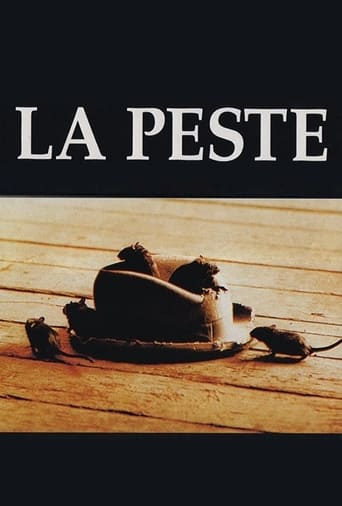Peter-174
Too talkative. Crappy acting. Pathetic writing. I could go on for a while... It is a shame that such good material was wasted. The film is clueless, since the makers had no vision. The film even manages to become boring. It also tries too hard to be meaningful and deep, but it just isn't intelligent enough. The photography is OK, though. But that's about the only good thing in this movie. As far as I know the film is only out on DVD in Asia. The DVD can often be found on eBay. Not that I would advise you to buy it, though.The DVD is 4:3.Some of the actors deliver performances that are far below their usual standard. This must mean that director Puenzo did a lousy job.
vercingetorix-2
"La Peste" (The Plague), the film adaptation of the 1947 novel by French existentialist Albert Camus, received poor reviews and was a box office bomb and rightfully so-- except for the presence of French actress (speaking in English) Sandrine Bonnaire, as TV journalist Martine Rambert (in the novel, the character is a male newspaper journalist) Her conversation with Wm.Hurt (as Dr. Riseux), in the doctor's office, must go down as one of the most superb scenes in film history: "Do you have memories? None of us has memories. or hopes. And love needs both, doesn't it?" Sandrine Bonnaire (Vagabond, Monsieuer Hire, Joan the Maiden, La Ceremonie) answers Camus' (and everyone confronted with despair) philosophical questions from a Female point of view. Yet, as in Sandrine Bonnaire's best works,she is a woman alone in a hostile male environment. La Peste is an "etalage" or showcase for the depth, range and beauty of one of film's greatest actresses: Sandrine Bonnaire.
transmet451
People seem awfully hard on this movie, and I don't quite understand why.It must suffer in comparison with the book. Granted no filmmaker could possibly match Camus brilliance, but this is a pretty solid movie. One thing that disappointed me was the descision to remove the story from the time period. The time setting is integral to the allegory. All in all, though, a good reconstruction.
loui-in-stlouis
imperfect only because mr. hurt takes his traum-welt sleepwalking characterization too far, and mr. puenzo drops the emotional anvil one time too many, this is nevertheless the most artistic political commentary i have seen. i compare it to CLOSETLAND. camus set the novel in his home of algiers, and mr. puenzo reprises with the buenos aires location that is his home. like post-war camus, mr. puenzo has much to say about his country's recently fallen dictatorship. camus would certainly have approved. the timing, in the face of the literal plague of aids, adds to the momentousness of this film.sandrine bonnaire, robert duvall, and jean-marc barr are essential to the movie, and the sheer pulchritude of buenos aires shows, even though the city is cast as hapless, plague-stricken oran. it is the tragedy of argentina that makes it a perfect oran. and it is the beauty of its capital federal that makes it a perfect setting for camus' triumph of humanity over inhumanity.the movie is complex, with explicit visual reference to the holocaust, and even a fair treatment of the complicity of the medical doctor (whose responsibility? remember, camus was above all an existentialist author). but the movie is not about a public health disaster, or oran, or the insanity and subsequent tragedy of civil resignation in germany's 1930's. oran could be anywhere at any time, and mr. puenzo has understood camus well on this point.



